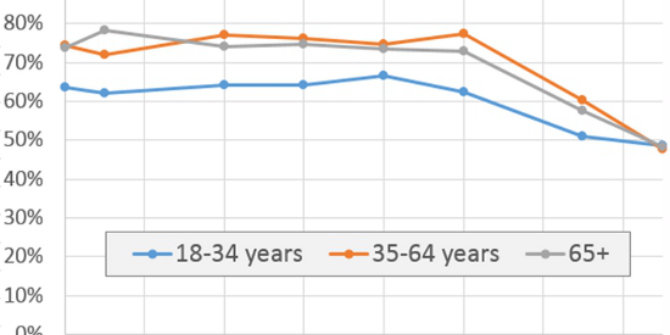
 The Troubled Families Programme, launched by the coalition in the aftermath of the 2011 riots, was tasked with ‘turning around’ the lives of the 120,000 most ‘troubled families’ in England through intensive family intervention work. Despite the consensus being that it failed to do so, a recent policy brief suggested otherwise. Stephen Crossley and Roger Smith critique the research behind the brief.
The Troubled Families Programme, launched by the coalition in the aftermath of the 2011 riots, was tasked with ‘turning around’ the lives of the 120,000 most ‘troubled families’ in England through intensive family intervention work. Despite the consensus being that it failed to do so, a recent policy brief suggested otherwise. Stephen Crossley and Roger Smith critique the research behind the brief.
The Troubled Families Programme (TFP) has, in recent years, adopted a low profile after an official evaluation was ‘unable to find consistent evidence’ that it had ‘any significant or systematic impact’ across key objectives. The criticisms are well rehearsed. The misrepresentation of research at the outset of the programme, the invention of statistics to make the case for ‘radical reform’, the claim that it was almost perfect in its first phase, its rapid expansion prior to evaluation, the failure to learn from previous mistakes, and the attempted ‘suppression’ of the evaluation are all areas where the TFP has faced serious and legitimate questions. It therefore came as something of a surprise when, in November 2017, the Government Performance Lab at Harvard Kennedy School published a policy brief stating that the TFP ‘provides a ground breaking model of transforming service delivery for the country’s most vulnerable families’.
None of the critiques highlighted above, nor any academic sources of any kind, were mentioned or used in the brief. Indeed, the complete absence of academic rigour is startling; the report relies for its methodology on a highly selective series of interviews, and does not substantiate the claims made by respondents – most of whom would appear to have a prima facie vested interest in making the programme look good.
Instead, the policy brief focused ‘mostly on the positive lessons coming out of the TFP initiative’ and drew entirely on government sources and interviews with ‘various stakeholders including elected councillors, TFP managers, supervisors, key workers, and families’ in six local authority areas, all of which were ‘identified by DCLG as success stories’. The authors note that their findings from these fieldwork sites, whilst not comprehensive ‘provide valuable learning on aspects of the TFP initiative that were successful and can provide insights to help solve the complex challenges associated with effective social service delivery’. The finding of no ‘significant impact’ from the evaluation was mentioned once, but brushed aside with the argument that ‘many local authorities have piloted innovations that are worth learning from’. One such ‘innovation’ in Barking and Dagenham involved rejecting the initial TFP approach and reverting to an earlier model of practice which itself has been significantly undermined by repeated government funding cuts.
If we turn our attention to the substance of the report, the omission of competing or critical perspectives remains noteworthy. One of the key elements of the ‘family intervention’ approach that the TFP is based on the ability of the family worker to develop strong relationships with the family. A second key element is the use of a ‘whole family’ approach where all members of the family are worked with under the same programme, rather than different services working with different individuals in the same family. The policy brief reiterates these tropes. For example, interviews with families apparently highlighted that the relationship with their key workers was ‘a critical component to the programme’s success’. In essence, the authors lapse into homely anecdotes to illustrate this claim.
The official evaluation of the programme offers up an alternative perspective, which emerged from arguably a much more robust methodological and ethical approach. A family survey that formed part of the official evaluation gathered responses from 495 families who had been on the TFP for around nine months and also included responses from a comparison group of 314 families who were about to start the programme. The section of the survey report that discusses families’ relationships with their worker was forced to omit 71 families (14%) because they could not remember or did not know the name of their ‘keyworker’. Around 78% of families saw their worker once a week or less, with around 20% of families seeing their worker once a month or less often, so it is unclear how strong their relationship could be. Main carers also cast doubt on the ‘whole family’ approach, reporting that workers were not ‘in contact’ with the children in over 40% of families and were in contact with fewer than one in ten (9%) resident partners and only one in 50 (2%) non-resident partners. The family survey itself mirrored the impact study and found:
little evidence that the Troubled Families Programme significantly affected the outcomes of families around nine months after starting the programme… There were no positive (or negative) impacts identified for housing, employment and jobseeking, anti-social behaviour and crime, school behaviour and attendance, health, drug or alcohol use, family dynamics or well-being.
There are other elements of the policy brief that deserve further examination, which cannot be covered in detail here. The belief amongst some local authorities that the TFP had ‘encouraged evidence-based decision making’ is interesting given that it flies in the face of almost all of the evidence surrounding it. The use of electronic markers which are attached to the personal data of individuals and ‘flag’ them up as members of ‘troubled families’ to the police and the Department for Work and Pensions is also worrying, leading to new forms of labelling, monitoring and surveillance; redolent indeed, of the highly touted and spectacularly unsuccessful Integrated children’s System of only a few years ago. The belief of one key worker that the programme ‘at its core is about “motivating families to succeed”’ highlights one of the major critiques of the TFP: that it focuses on responsibilising families and changing their behaviours, while marginalising structural and societal issues, including the many recent cuts to just the sort of programme the policy brief seems to be applauding.
The TFP has been one of the most controversial policies of recent years, for a wide variety of reasons. So it is worrying that an institution with the reputation of Harvard would produce such a shallow and academically weak document extolling the virtues of a programme that lacks a credible evidence base and has been roundly criticised by respected commentators from a variety of different disciplines. To add to the embarrassment, the (extremely limited) evidence presented in the policy brief, collected with the support and assistance of DCLG, largely contradicts the evidence presented in different strands of the official evaluation, the publication of which was severely delayed and which the government allegedly tried to suppress. It is a shame that powerful institutions on both sides of the Atlantic appear unable or unwilling to engage with empirically informed criticism.
_______
About the Authors
 Stephen Crossley is a Senior Lecturer in Social Policy at Northumbria University. A summary of his PhD on ‘troubled families’ can be found here. His book on the TFP, ‘Troublemakers’, will be published by Policy Press in April 2018.
Stephen Crossley is a Senior Lecturer in Social Policy at Northumbria University. A summary of his PhD on ‘troubled families’ can be found here. His book on the TFP, ‘Troublemakers’, will be published by Policy Press in April 2018.
 Roger Smith is Professor of Social Work at the University of Durham. He has published extensively on youth justice, power, and values in social work. His latest book, ‘Diversion in Youth Justice’, published by Routledge, is available now.
Roger Smith is Professor of Social Work at the University of Durham. He has published extensively on youth justice, power, and values in social work. His latest book, ‘Diversion in Youth Justice’, published by Routledge, is available now.
All articles posted on this blog give the views of the author(s), and not the position of LSE British Politics and Policy, nor of the London School of Economics and Political Science. Featured image: Pixabay (Public Domain).





